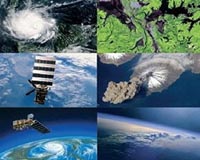 |
Daejeon, South Korea (SPX) Oct 19, 2009 How best to cope with the rising tide of orbital space debris? What international rules of behavior are required for safe operations in space? Can there be a sustainable space environment for world-wide space activities? These and other issues are to be addressed in a special panel discussion on "Achieving a Sustainable Space Environment for Future Space Activities." This constructive dialogue is being held as a plenary event at the 60th International Astronautical Congress (IAC) - a seminal meeting being held in Daejeon - the science city of South Korea and an event that has attracted more than 3,000 participants from 72 countries. South Korea has become a player on the international space scene relatively recently. It set up its own space agency in 1980 and defined its first space plan in 1996. Thanks to cooperation with the world's leading spacefaring nations, it is now able to build satellites almost autonomously.
International rules of behavior Dr. Ray Williamson, Executive Director of Secure World Foundation (SWF), chair of the special panel noted: "This is the first time that the International Astronautical Congress has mounted a plenary session on the subject of maintaining the long term sustainability of space activities. It is a recognition that the world needs to come together to develop appropriate international legal instruments to guide space activities for the future." Williamson added that "the world urgently needs to pay attention to the impact of the increasing orbital debris population on space activities and to improve the prospects for establishing international rules of behavior for space operations." SWF's Williamson said that the group of experts will examine the prospects for cooperative, international space situational awareness as a contribution to achieving a sustainable space environment for space activities. Williamson underscored the valuable contributions of his fellow panel discussants: + Dr. K. Kasturirangan, Honorable Member of the Planning Commission of the Government of India will speak on cooperative approaches to the long term sustainability of space activities. + Nicholas Johnson, Chief Scientist for Orbital Debris, NASA Johnson Space Center is to detail debris and spacecraft in Earth orbit. + Dr. Sergio Camacho, Director General of CRECTEALC, the Regional Center for the Teaching of Science and Technology of Space in Latin America and the Caribbean. He will speak to space sustainability and emerging space actors. + Dr. Kai-Uwe Schrogl, Director, European Space Policy Institute, is to address the steps toward a long-term stability in outer space. Share This Article With Planet Earth
Related Links Secure World Foundation (SWF) 60th International Astronautical Congress (IAC) Space Technology News - Applications and Research
 Experts Detail Need For Sustainable Outer Space Environment
Experts Detail Need For Sustainable Outer Space EnvironmentDaejeon, South Korea (SPX) Oct 16, 2009 How best to cope with the rising tide of orbital space debris? What international rules of behavior are required for safe operations in space? Can there be a sustainable space environment for world-wide space activities? These and other issues are to be addressed in a special panel discussion on "Achieving a Sustainable Space Environment for Future Space Activities." This constructive ... read more |
|
| The content herein, unless otherwise known to be public domain, are Copyright 1995-2009 - SpaceDaily. AFP and UPI Wire Stories are copyright Agence France-Presse and United Press International. ESA Portal Reports are copyright European Space Agency. All NASA sourced material is public domain. Additional copyrights may apply in whole or part to other bona fide parties. Advertising does not imply endorsement,agreement or approval of any opinions, statements or information provided by SpaceDaily on any Web page published or hosted by SpaceDaily. Privacy Statement |